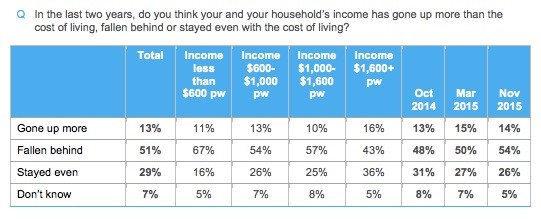Labor’s proposal to limit negative gearing to new housing has support among voters, but there’s also considerable voter confusion about it, new polling from Essential Research shows.
Asked if they support Labor’s negative gearing proposal announced the weekend before last, 38% of voters said they approved of it, while 28% disapproved of it — but 32% said they did not know. But in an illustration of how party branding affects the way voters view policy, the response changes significantly depending on whether Labor is linked to the proposal.
Voters split 38%/28% when voters were asked about “Labor Party’s policy to change negative gearing” but when voters are asked about “changing negative gearing”, they split 37%/32%. Coalition voters responded 40%/36% in favour when the latter, non-Labor branded question was asked, but responded 29%/44% when Labor’s name was added to the proposal. Similarly, while Labor voters backed the proposal 43%/29% when it was put to them without Labor’s association, support rose to 56%/19% when Labor was mentioned as having made the proposal.
The poll also gives an insight into how Australians on different income levels view their financial situation. Although 6% of voters agreed with the statement “I don’t have enough money for basic essentials like housing food and electricity”, including 20% of people earning less than $600 a week, the overall number is slightly down from March 2015 (8%). And 35% agreed with the statement “I have enough money for basic essentials but I cannot save any money”, including 49% of people earning less than $600 a week, 41% of those earning $600-$1000 a week, 44% of those earning $1000-$1600 a week and even 24% of those earning over $1600 a week. Nearly half of voters agreed that they could say a little money, but only 8% said they were able to save “a lot” of money.
Two-thirds of people earning less than $600 a week say their income has failed to keep pace with the cost of living in the last two years (and 51% of all voters say that).

However, voters may finally be registering the extended period of low inflation Australia has enjoyed for several years. Asked if they’re paying more or less for basics, 19% of voters (wrongly) say they’re paying “a lot more” for petrol than two to three years ago, but that’s down from 56% in March 2014; 22% of voters say they’re paying a little less; 3% acknowledge they’re paying a lot less. A quarter of voters saying they’re paying a lot more for fruit and vegetables than 2-3 years ago but that’s down from 36% in 2014; 34% say they’re paying a lot more for electricity and gas but that’s nearly halved from 62%. Fourteen per cent say they’re paying a lot more for housing costs such as mortgage or rent but that’s down from 24%; water is down to 13% from 40%; packaged food is down to 15% from 26%.
Nevertheless, voters’ views of the economy have deteriorated slightly since November. Voters are more likely to think company profits, their own financial situation, wages and the economy overall are worse than a year ago, compared to when the same question was asked in November. However, they are a little more likely to think unemployment, job security, electricity costs and the cost of living have improved or stayed the same over the last year.
On voting intention, the Coalition is up a point to 44% on its primary vote while Labor is up two points to 3%. With the Greens down a point on 10%, the two-party preferred outcome is unchanged on 52%-48% to the government.








I hope Labor is up 2% to more than 3%. Obviously.
Hard days for Labor apparently.
Hard to believe that BK tossed off this piece of journeyman transcription – where’s the beef?